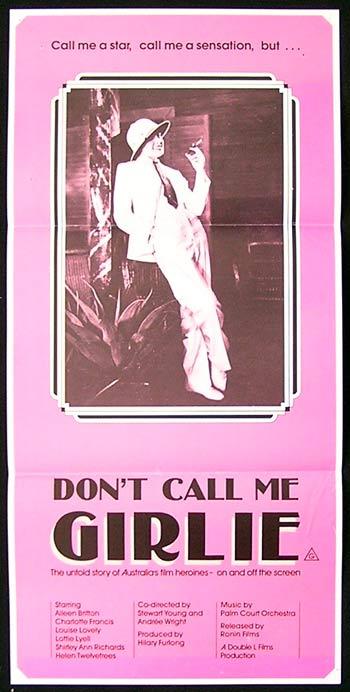
DON'T CALL ME GIRLIE
Australia, 1985, 100 minutes, Colour.
Directed by Andree Wright, Stewart Young.
Don't Call Me Girlie is an entertaining and interesting documentary paying tribute to the women in the early Australian film industry.
The film is a blend of clips from old films, interviews with people involved in front of the cameras as well as behind them during the '20s.
The film uses archive material well - with humorous and ironic touches.
The early part of the film pays tribute to actress Lottie Lyall. Well-known for her performance in The Sentimental Bloke, the film traces her short career from such fragments as The Romance of Margaret Catchpole from 1911 through a number of films in which she not only starred in but also made valuable comments in the direction line. The film highlights her relationship with director Raymond Longford - indicating that Longford was very much dependent on Lottie Lyall as a film-maker and adviser. But, in the atmosphere of the times, this was not recognised. There are some acerbic comments about Longford and the indication that his talent was not able to sustain itself after Lottie Lyall's untimely death.
The film also shows the image of women in the early films from the drawing room melodramas and comedies of the second decade of the century into the pictures of the girls of the bush. This was also a feature of some of Ken Hall films of the '30s.
Various women receive tribute in the film e.g. Agnes Gavin, wife of writer-director, John Gavin. The indications are that Agnes Gavin was a film-writer of considerable ability.
Of importance during the 20s and into the 30s was the career of the McDonagh? sisters - who wrote, produced, acted and directed. They achieved success with sophisticated melodramas of the 20s but with their last film, Two Minutes Silence, they had too sombre a film for the Depression era. They were unable to continue their career (and the commentary notes that no feature film was directed between 1934 and 1979 by women. Gillian Armstrong’s My Brilliant Career marked a new phase in women directing).
The film has several interviews with stars of the 20s and 30s who reminisce about ,their roles and their treatment. Some are amazed as they look back. 'Some have happy memories of Lottie Lyall. Some indicate that they were never pleased with their treatment. This is especially true of Jean Hatton who emerged in Ken Hall's Cinesound films of the late 30s,and was billed as Australia's Deanna Durbin, something which she emphasises that she never liked.
In focusing on the films of the 30s, attention is given to star Shirley Anne Richards who gives a very interesting account of working for Cinesound. Nancy Gurr, who worked with Ken Hall in publicity, also gives many illuminating comments about the star system of the 30s - including the visit of Helen Twelvetrees, a Hollywood star, to Australia for the film Thoroughbred. Veteran actress, Aileen Britton, also comments at some length on her role in the melodrama Tall Timbers, thus enabling her to make some comment on the way that, 'bad, women’ were treated in the films of the time.
The excerpts from archives illustrate very well the points being made - especially in the excerpt from Dad and Dave Come to Town which gives the film its title. Shirley Anne Richards highlights how the Dad and Dave comedies became more sophisticated by 1938 - they even inherit a frock shop and Shirley Anne Richards' character is to be manager. The salesman comes in to pay a courtesy call - and she indicates that he should, therefore, take his hat off. He wants to see the manager and, when told that she is, makes a wisecrack about not laughing before lunch and refers to her as 'Girlie'. Her stern reply is ‘Don't call me Girlie’.
The film is not only a contribution to understanding of the Australian film industry but also is a useful documentary highlighting, the transitions in the status of women in Australian society during the early decades of the 20th. century.